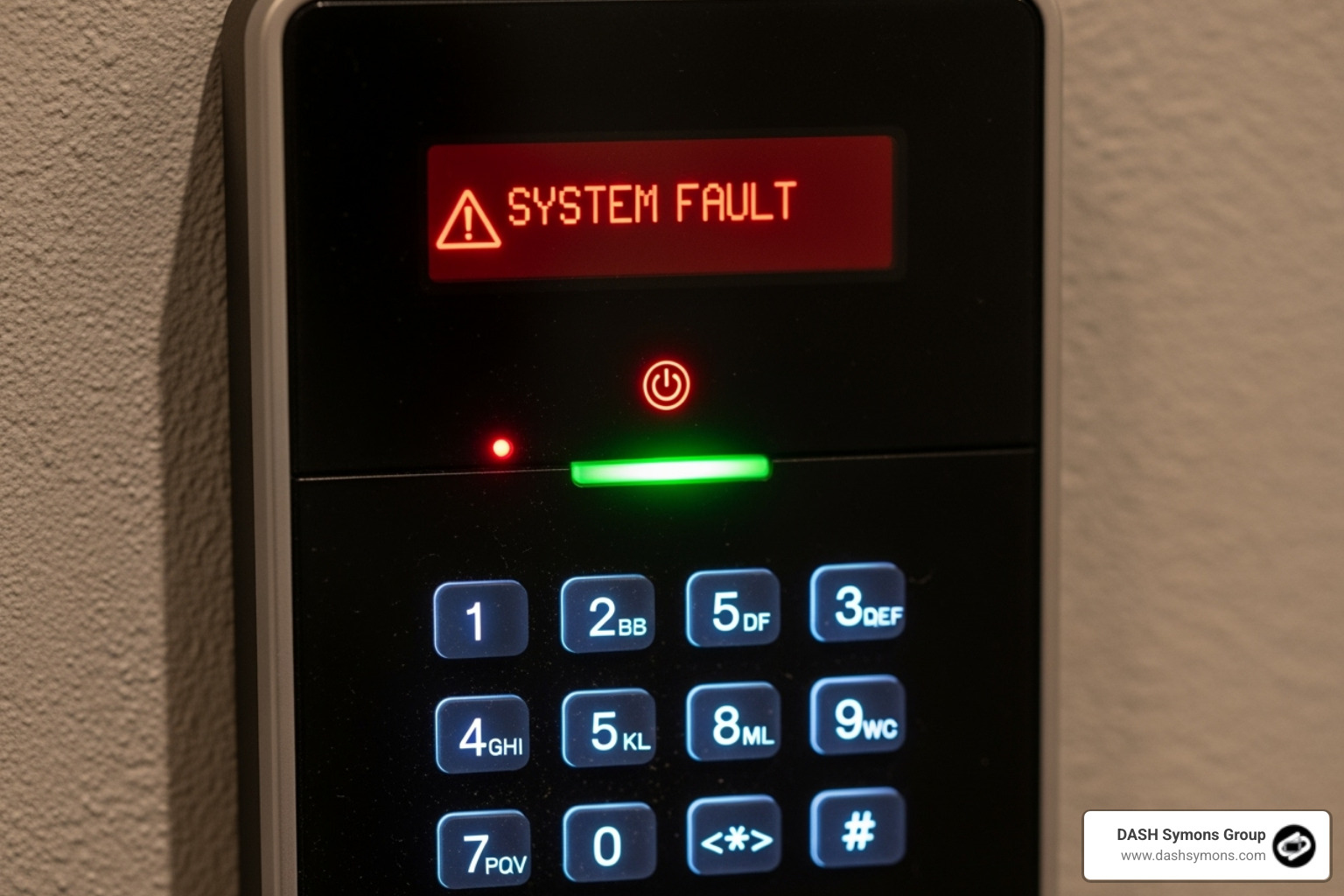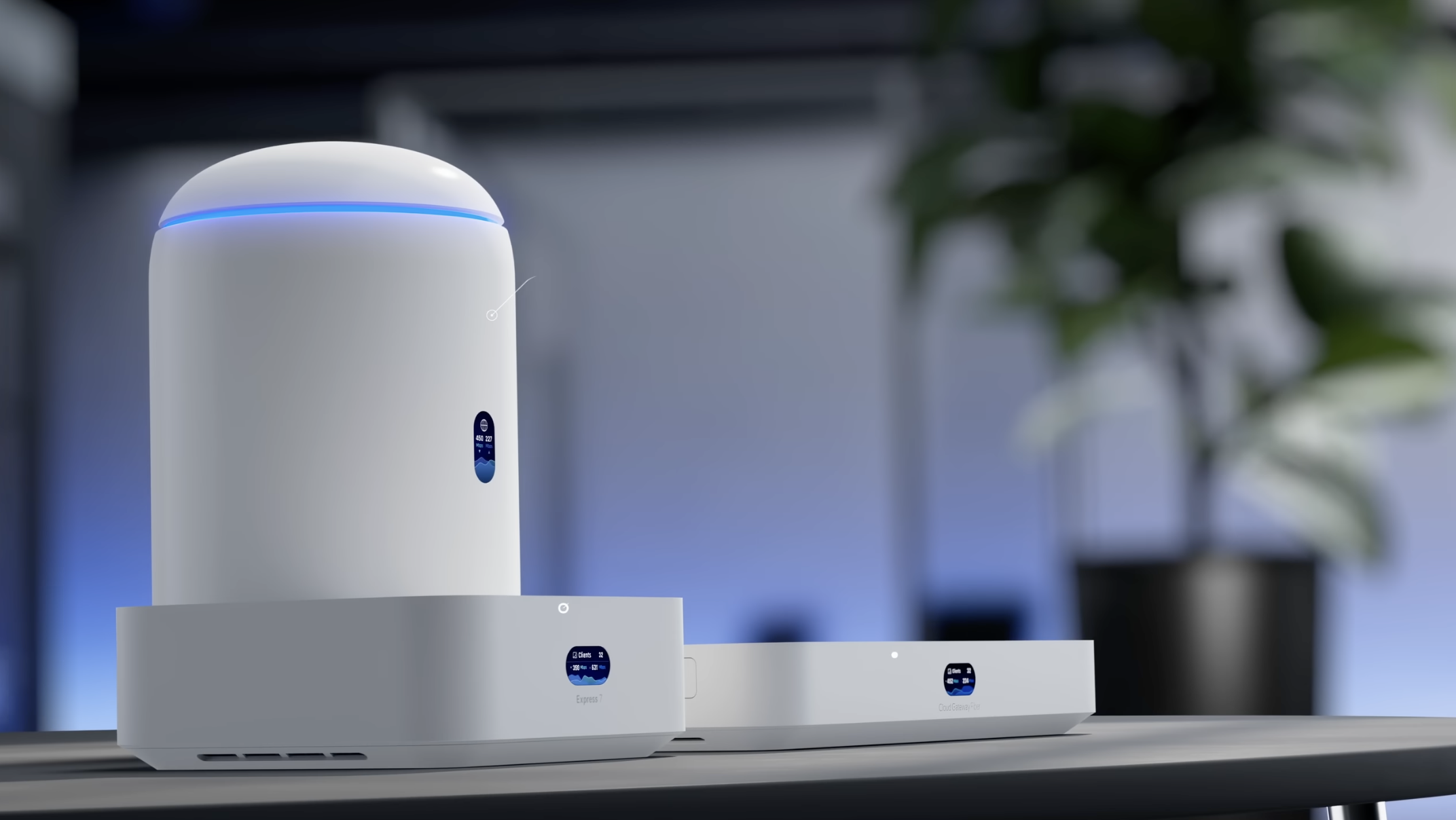Security system repair services are essential when your alarm system starts beeping at 3 AM, your cameras go blank, or your keypad becomes unresponsive. These malfunctions don't just cause frustration - they leave your property vulnerable when you need protection most.
Common Security System Issues:
As one security expert puts it: "A faulty alarm system is about as useful as a chocolate teapot." When your security system fails, you're not just dealing with an inconvenience - you're facing a real safety concern that puts your property and loved ones at risk.
The good news is that many security system problems have straightforward solutions. Some issues can be resolved with simple DIY troubleshooting like replacing batteries or cleaning sensors. Others require professional expertise, especially when dealing with wiring problems, component failures, or system upgrades.
Understanding when you can handle repairs yourself versus when to call professional technicians can save you time, money, and ensure your system provides reliable protection. Professional services become essential when dealing with complex integrated systems that combine alarms, CCTV, access control, and automation - where improper repairs could compromise your entire security network.

Picture this: it's 3 AM and your security system starts beeping like an angry smoke detector. You stumble downstairs, squint at the keypad, and see cryptic error messages that might as well be written in ancient hieroglyphics. Sound familiar?
When your security system starts acting up, it's not just testing your patience – it's potentially compromising your safety. That annoying beeping from your control panel isn't just background noise; it's your system's cry for help. Whether it's signaling a low battery, communication fault, or sensor malfunction, ignoring these warnings is like ignoring your car's check engine light.
False alarms present another frustrating challenge that can turn your reliable protector into the security equivalent of the boy who cried wolf. When your motion detector treats your cat like a cat burglar, or a faulty window contact triggers alerts every time the wind picks up, you might start ignoring genuine threats. Some areas even fine homeowners for excessive false alarms, adding insult to injury.
An unresponsive keypad that won't arm or disarm your system essentially renders your entire security setup useless. Similarly, faulty sensors on doors and windows create blind spots in your protection, while camera feed issues leave you literally in the dark about what's happening on your property.
Connectivity loss between your system components or with monitoring services means you're flying blind when you need visibility most. Modern security systems rely on seamless communication – when that breaks down, your integrated protection crumbles.
Don't overlook those low battery warnings either. Your backup batteries are your system's lifeline during power outages, which coincidentally tend to be when break-ins are more likely to occur.
The most obvious red flag is a beeping keypad that won't stop its electronic tantrum, usually indicating battery issues or communication errors that need immediate attention.
Frequent false alarms suggest sensor problems, environmental interference, or installation issues that require a professional security system repair to restore reliability.
When your control panel displays a "Not Ready" status and refuses to arm, it's typically detecting an open door, window, or malfunctioning sensor that needs investigation.
Motion detector failure manifests as sensors that either miss genuine movement or trigger without cause, compromising your system's effectiveness.
Door and window contact errors often result from physical damage, misalignment, or corroded connections, leaving critical entry points unprotected.
Blank video feeds from your CCTV cameras defeat the purpose of visual monitoring, whether caused by power issues, connectivity problems, or hardware failure.
System communication failure prevents your security setup from talking to monitoring centers or mobile apps, eliminating remote oversight capabilities.
Not every hiccup requires professional intervention. Sometimes a simple system reboot works magic, clearing temporary glitches just like restarting your computer. Temporary power loss can trigger false alerts that resolve once electricity returns and backup batteries recharge.
User error accounts for many perceived problems – forgetting to close a window before arming the system or accidentally pressing wrong buttons happens to everyone.
However, persistent issues that survive basic troubleshooting indicate deeper problems. When the same sensor repeatedly malfunctions despite your best efforts, or your control panel remains unresponsive after multiple reboot attempts, you're likely facing critical component failure.
These major faults create genuine vulnerability risks that no amount of DIY tinkering can resolve. Damaged wiring, failed communication modules, or corrupted system software require professional expertise to restore proper protection. Attempting complex repairs yourself might inadvertently create new problems or void warranties, making professional security system repair the smarter choice.
When your security system starts acting up, there's usually a story behind the malfunction. Understanding what causes these problems can help you spot trouble early and know when it's time to call in the professionals for a security system repair.
Think of your security system like a car – it needs regular care, and sometimes things just wear out or get damaged by forces beyond your control. The good news is that most problems fall into predictable categories, making them easier to diagnose and fix.
Electrical surges are among the biggest troublemakers for security systems. When lightning strikes nearby or your local power grid hiccups, the resulting surge can fry delicate electronic components faster than you can say "power outage." While surge protectors help, a really nasty surge can still sneak through and cause havoc. According to the Surge protector entry on Wikipedia, even high-quality surge devices have limits when faced with extremely large transient voltages, which is why additional grounding and professional design are so important.
Backup battery failure is another common culprit that catches homeowners off guard. Your system's backup battery is like a faithful guard dog – it works quietly in the background until the power goes out, then springs into action. But batteries don't last forever. After a few years, they start losing their ability to hold a charge.
We see plenty of cases where corroded battery terminals create intermittent power problems. The white, crusty buildup around battery connections might look harmless, but it can disrupt power flow and even damage your control panel over time.
Faulty transformers and incorrect wiring can also create ongoing headaches. When the power supply isn't stable or properly configured, your system might work fine most of the time but act unpredictably when you need it most.
Beyond electrical problems, the physical world has its own ways of interfering with your security system. Aging electronics are simply a fact of life – after years of faithful service, internal components start wearing out. It's like the difference between a brand-new car and one with 200,000 km on it.
Environmental factors can be surprisingly destructive. Dust and insects love to make themselves at home in warm electronic enclosures. A spider web across a motion detector lens or dust buildup on a camera can turn your high-tech security into an expensive paperweight.
Then there are the more unusual suspects. Vermin damage to wires might sound like something from a cartoon, but rodents genuinely love chewing on cables. We've seen entire systems knocked offline by a determined mouse with a taste for copper wiring.
Weather plays its part too. Extreme temperatures can cause components to expand and contract, leading to loose connections. Humidity can create condensation inside outdoor cameras and sensors, while worn-out sensors simply stop working reliably after years of constant use.
Dirty camera lenses and misaligned magnetic contacts on doors and windows are often overlooked until they cause problems.
Don't forget about software glitches and outdated firmware. Like your smartphone, security systems need software updates to work properly. When the digital brain gets confused or outdated, even perfectly good hardware can start misbehaving.
The key is recognizing that most of these issues are normal wear and tear rather than design flaws. Regular maintenance and prompt attention to problems can keep your system running smoothly for years to come.
When your security system starts acting up, your first instinct might be to grab your toolkit and dive in. And honestly, that's not always a bad idea! Many security system issues can be resolved with some basic troubleshooting that doesn't require a degree in electronics or years of experience.
The key is understanding where the line exists between a simple fix you can handle yourself and a complex problem that needs professional expertise. Think of it like your car - you might change the oil or replace windshield wipers, but you probably wouldn't attempt to rebuild the engine. The same principle applies to security system repair.
Before calling in the professionals, there are several straightforward checks you can perform that might save you both time and money. Start by checking your control panel for error messages. Modern systems are quite good at telling you what's wrong - they'll display error codes or specific messages that can point you in the right direction. Your system manual is your friend here, so dig it out and decode those cryptic messages.
Sometimes the simplest solutions are the most effective. Rebooting your system can clear temporary software glitches that cause erratic behavior. Just like restarting your computer when it freezes, powering down your security system for a few minutes can work wonders. Disconnect both the main power and backup battery, wait a few minutes, then reconnect the battery first followed by the main power.
Battery replacement is probably the most common DIY fix you'll encounter. Those persistent beeps from your control panel or individual sensors are usually crying out for fresh batteries. Most wireless sensors and the main control panel have backup batteries that need periodic replacement - it's just part of normal maintenance.
Don't underestimate the power of a good cleaning session. Dust, cobwebs, and even tiny insects can wreak havoc on motion sensors and camera lenses. A gentle wipe with a soft, dry cloth can restore proper function to components that seemed to be failing. For cameras, make sure the lens is crystal clear - a smudged lens might make you think your camera is broken when it just needs a quick polish.
After any DIY repair attempt, always test your entire system thoroughly. Walk past motion detectors, open and close doors with sensors, and arm and disarm your system to ensure everything is working correctly.
While DIY troubleshooting can resolve many issues, there are definite times when professional security system repair is not just recommended - it's essential. Recognising these situations can prevent you from making a problem worse or putting your safety at risk.
Persistent false alarms that continue despite your troubleshooting efforts indicate a deeper problem that requires expert diagnosis. What seems like a simple sensor issue might actually be a wiring problem, interference from other devices, or a component that's failing in a way that's not immediately obvious.
Any situation involving damaged wiring should be handled by professionals. Whether it's rodent damage, construction mishaps, or general wear and tear, wiring issues can be safety hazards. Attempting to repair damaged wiring without proper training and tools can create fire risks or compromise your entire system's reliability.
When your control panel becomes completely unresponsive or shows critical system errors that won't clear, it's time to call in the experts. The control panel is the brain of your system, and when it fails, everything else becomes unreliable. Professional technicians have the diagnostic tools and usually the replacement parts needed to get your system back online quickly.
Component replacement often requires more than just swapping out parts. Modern security systems need proper calibration and configuration to work correctly with existing components. This is especially true for integrated systems that combine Alarm System Services, CCTV System Services, and Access Control System Services.
If you're dealing with system upgrade issues or want to integrate new smart home features, professional installation ensures everything works together seamlessly. Modern security systems are increasingly complex, and proper integration requires understanding of communication protocols, network configuration, and compatibility requirements.
After a break-in or vandalism, never assume your system is working properly just because it appears undamaged. Professional inspection can identify subtle damage or tampering that might compromise your security. This is not the time to take chances with your safety.
The reality is that today's security systems are sophisticated networks of interconnected devices. When problems arise, professional technicians bring not just technical expertise, but also the right tools, replacement parts, and understanding of how all the pieces work together to keep your property secure.

When your security system starts acting up, you're faced with a choice that directly impacts your safety and peace of mind. Not all security system repair technicians are created equal, and choosing the wrong one could leave you more vulnerable than when you started.
Think of it this way: you wouldn't trust your heart surgery to someone who just watched a YouTube video, so why trust your security to an inexperienced technician? The right professional can mean the difference between a quick, lasting fix and a recurring nightmare of system failures.
Experience matters more than you might think in security system repair. A seasoned technician has seen everything from lightning-fried control panels to mysterious intermittent faults that only happen on rainy Tuesdays. This experience translates into faster diagnosis times and solutions you might never have considered.
Industry certifications aren't just fancy pieces of paper on the wall. They demonstrate that a technician has invested time in staying current with evolving technology and industry standards. Look for certifications that show ongoing education and commitment to professional development.
Being licensed and insured protects both you and the technician. It's your assurance that they operate legally and that you won't be left holding the bag if something goes wrong during the repair. Insurance coverage also indicates a level of professionalism and accountability that fly-by-night operators simply don't have.
Problem-solving skills separate good technicians from great ones. Security systems can be finicky, and sometimes the obvious solution isn't the right one. A top-tier technician approaches each problem methodically, using their experience to think outside the box when standard fixes don't work.
Adherence to standards ensures your system will function reliably for years to come. This includes following proper wiring practices, using quality components, and ensuring all work meets safety requirements. Check product warranty information to understand how improper repairs might void your coverage.
Before you commit to any repair service, arm yourself with the right questions. "Do you service systems installed by others?" is crucial because many companies prefer selling new systems over repairing existing ones. At DASH Symons Group, we believe in fixing what you have when it makes sense, regardless of who originally installed it.
"What is your response time?" matters when your security is compromised. A system that's down for weeks isn't protecting anything. Look for companies that can provide fast service for urgent issues.
"Are your technicians licensed?" should be a given, but it's worth confirming. Licensed technicians have met minimum competency requirements and are accountable to regulatory bodies.
"Can you provide a quote?" protects you from surprise charges when replacement parts are required. Transparent pricing means you know what you're paying for upfront, with no hidden fees lurking in the fine print.
"Do you have experience with integrated systems?" becomes increasingly important as security systems become more sophisticated. Modern setups often combine alarms, CCTV, access control, and automation into unified platforms. A technician who understands these interconnections can diagnose problems more effectively and ensure repairs don't disrupt other system functions.
The right security system repair provider becomes a trusted partner in maintaining your security infrastructure. They should make you feel confident that your system is in capable hands, not leave you wondering if the repair will hold up when you need it most.
Think of your security system like your car - you wouldn't wait for it to break down on the highway before getting it serviced, would you? The same principle applies to security system repair and maintenance. While fixing problems as they arise is important, preventing them in the first place is even smarter.
When you invest in proper maintenance, you're not just avoiding the midnight panic of a malfunctioning alarm. You're actually saving money in the long run by extending your equipment's lifespan and preventing those expensive emergency repair calls. A well-maintained system also means fewer false alarms, which keeps you in good standing with local authorities and prevents those awkward conversations with neighbors about why your alarm went off at 2 AM again.
There's another benefit many homeowners don't realise: insurance discounts. Many insurance providers offer significant reductions on premiums for properties with functional security systems. Some homeowners save up to 20% on their insurance, but only if their system is actually working when it's needed most.
Regular maintenance is like having a crystal ball for your security system. During routine checks, we can spot weakening batteries before they die completely, notice slightly misaligned sensors before they start triggering false alarms, and identify corroding connections before they cause system failures.
This proactive approach means your cameras stay crystal clear, your motion detectors remain accurate, and your control panel communicates reliably with monitoring centers. For businesses especially, this prevents the costly downtime that comes with security system failures - not to mention the potential liability issues if something happens while your system is down.
Optimal performance isn't just about preventing break-ins either. A well-maintained system integrates smoothly with your daily routine, arms and disarms reliably, and gives you that invaluable peace of mind knowing everything is working as it should.
At DASH Symons Group, our Programmed Maintenance for Security Systems is designed specifically to keep your security infrastructure running smoothly, so you can focus on what matters most to you.
Today's security systems are far more sophisticated than the simple burglar alarms of decades past. Modern security is about seamless integration where your alarm system, CCTV cameras, access control, and smart home automation work together like a well-orchestrated symphony.
When properly maintained, your alarm system provides the core protection, while CCTV integration gives you visual confirmation of what's happening. This means you can quickly distinguish between your cat setting off a motion sensor and an actual intruder. Your access control system manages who gets in and when, while automation features can turn on lights when an alarm triggers or lock doors automatically.
But here's the thing about integrated systems - when one component starts having issues, it can create a domino effect throughout your entire security network. A faulty sensor might cause unnecessary CCTV recordings, eating up storage space. Network connectivity problems could prevent you from accessing your cameras remotely just when you need them most.
Centralized management of these integrated systems requires expertise that goes beyond basic repairs. It's about understanding how all these technologies work together and ensuring they continue to do so reliably. That's where our experience at DASH Symons Group really shines - we don't just fix individual components; we ensure your entire security ecosystem functions harmoniously.
When you choose professional security system repair and maintenance, you're investing in the reliability and effectiveness of your complete security infrastructure. It's about having a trusted partner who understands that your security system is your first line of defense, and its uninterrupted functionality isn't just convenient - it's essential.
When your security system starts acting up, it's more than just an inconvenience – it's a direct threat to your peace of mind. Throughout this guide, we've walked you through the journey from those first warning signs (that annoying 3 AM beeping!) to understanding what's really going wrong behind the scenes.
We've shown you that while some issues can be tackled with simple DIY fixes like replacing batteries or cleaning sensors, others require the experienced hands of professional technicians. The key is knowing when to grab a screwdriver yourself and when to pick up the phone for expert help.
System reliability isn't just about fixing what's broken – it's about creating a comprehensive security network that works seamlessly together. When your alarm systems, CCTV integration, access control, and automation systems all communicate properly, you get that invaluable sense of security that lets you sleep soundly at night.
Professional expertise makes all the difference when dealing with complex integrated systems. At DASH Symons Group, we understand that every beep, every blank screen, and every false alarm represents a potential vulnerability in your protection. That's why proactive maintenance through our Programmed Maintenance services is just as important as emergency repairs.
Our experienced technicans have seen it all – from lightning-fried control panels to rodents making themselves at home in wiring. What sets us apart is our commitment to being your trusted partner in long-term security. We don't just fix problems; we help prevent them from happening in the first place.
Your security system should be a source of confidence, not constant worry. Whether you're dealing with a current malfunction or want to ensure your system stays in peak condition, DASH Symons Group is here to help. Don't let a faulty system leave you vulnerable – ensure your system's reliability with our Programmed Maintenance services and experience the peace of mind that comes with truly professional security system repair and ongoing support.

